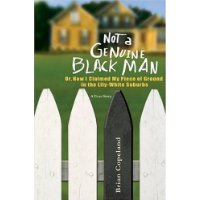
基本信息出版社:Hyperion
页码:272 页
出版日期:2006年07月
ISBN:1401302335
条形码:9781401302337
版本:Hardcover
装帧:精装
开本:16
正文语种:英语
外文书名:不是真正的黑人: 怎样才能在白人郊区标注我是黑人?
内容简介 Based on the longest-running one-man show in San Francisco history -- now coming to Off-Broadway -- a hilarious, poignant, and disarming memoir of growing up black in an all-white suburb
In 1972, when Brian Copeland was eight, his family moved from Oakland to San Leandro, California, hoping for a better life. At the time, San Leandro was 99.4 percent white, known nationwide as a racist enclave. This reputation was confirmed almost immediately: Brian got his first look at the inside of a cop car, for being a black kid walking to the park with a baseball bat.
Brian grew up to be a successful comedian and radio talk show host, but racism reemerged as an issue -- only in reverse -- when he received an anonymous letter: "As an African American, I am disgusted every time I hear your voice because YOU are not a genuine Black man!" That letter inspired Copeland to revisit his difficult childhood, resulting in a hit one-man show that has been running for nearly two years -- which has now inspired a book. In this funny, surprising, and ultimately moving memoir, Copeland shows exactly how our surroundings make us who we are.
作者简介 Brian Copeland is a comedian whose KGO radio program is the most popular in its time slot. Not a Genuine Black Man is currently in development as an HBO series. Copeland lives in San Leandro, California.
专业书评 From Publishers Weekly
This memoir offers a candid and funny response to those who question the racial authenticity of successful black men. After receiving a letter asserting that he is "not a genuine black man," Copeland"comic, actor, radio, talk show host"tries to understand the qualifications needed to earn the classification: "I can't swim. That's black. But I can't play basketball either." Raised in San Leandro, a suburb bordering Oakland, Calif., Copeland delves into his experiences as a lone black child struggling to blend in among a white majority. His mother attempted to assimilate in any way possible, converting to Catholicism and taking her family to "brunch" after church, despite resistance from whites. Copeland details a futile search for a barber who would consent to cut his hair, being searched by a security guard while trying to shop and receiving an eviction notice based purely on the color of the family's skin. Copeland's comedic talent is evident throughout the book, though he concedes that he uses laughter to keep the pain at bay and endured a time when he descended into depression. Honest and engaging, this memoir is a valuable book for anyone trying to straddle racial lines, for anyone who has ever felt out of place. (July)
Copyright © Reed Business Information, a division of Reed Elsevier Inc. All rights reserved.